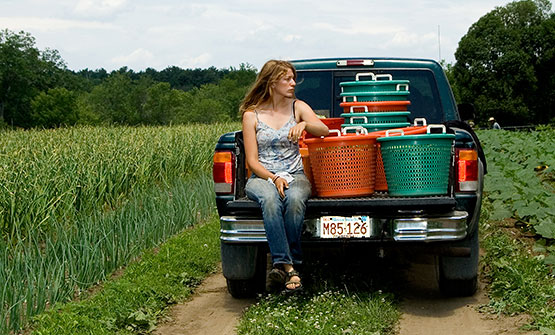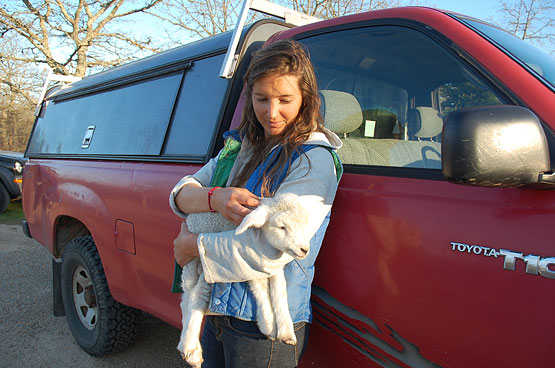Web Extra: Young Women Farmers
Awaiting the Harvest
Attracted by the physical and intellectual challenges of farming—which requires knowledge of subjects ranging from biology to marketing—recent liberal arts graduates are flocking to the profession. An increasing number of these young farmers are women. According to the last Census of Agriculture in 2007, the number of female farmers increased 30 percent since 2002. Here, we take a look at a few Vassar alumnae who have answered the call of the land and, as a result, have found themselves part of a larger movement that stresses healthier eating, environmental stewardship, and social justice.

Like many Vassar grads turned farmers, Lydia Sisson ’06 (above) got her first taste of the profession as a work-study student at the Poughkeepsie Farm Project, a nonprofit, member-supported farm located on the Vassar Farm and Ecological Preserve. The experience laid a good foundation for what was to come, she says. After majoring in environmental studies at Vassar, Sisson traveled to Europe, working on several Italian farms in exchange for room and board. Upon returning to the States, she held several internships—first with a farm project for at-risk youth in Lowell, Massachusetts; and then at a farm in South Hamilton, Massachusetts, where her work included teaching classes on farming to children and adults.
Sisson is now the owner and manager of Luna Farm, a five-acre, organic vegetable farm in North Reading, Massachusetts. She sells vegetables and flowers primarily through a community supported agriculture (CSA) program, a model in which members share in her crops’ yield throughout the growing season. She also wholesales to a cooperative market and manages farmers’ markets in North Reading. During her first year of operation, 2009, she worked the farm with her sister, Julia, currently a senior at Vassar, but she now runs the farm with her partner, Derek Mitchell.
In 2008, Sisson took a course to explore the business side of farming offered by New Entry Sustainable Farming Project, an extension program of Tufts University. The course guides first-year farm production and marketing efforts by helping students develop business plans, crop plans, cash flow projections, and market commitments. She is currently in her final year of the graduate program “Economic and Social Development of Regions” at the University of Massachusetts, Lowell. As part of her research assistantship, Sisson worked for the Tuft’s New Entry program, where she led workshops on how to raise chickens and process the birds as meat—she raised 500 meat chickens in the process! She also works with the Lowell Food Security Coalition, facilitating a community food assessment designed to evaluate the gaps and resources in the Lowell food system. A large component of the assessment is looking at whether the area’s diverse immigrant population is able to access enough culturally appropriate food. (The city has the second largest Cambodian population in the United States, as well as a bevy of transplants from other Asian, Latin American, and African countries.)
“I love Lowell and I’m really committed to it, ” Sisson says. “I’m still exploring ways to make my work more community focused.”

Lindsey Shapiro ’06 (above left) and Landon Jefferies ’07 (right), sociology and political science grads respectively, own Root Mass Farm, a vegetable farm in Oley, Pennsylvania, about an hour northwest of Philadelphia. The two met during Shapiro’s sophomore year and started dating two years later; they lived together in Philadelphia for a number of years before starting their farm.
Each has taken on a different aspect of the business: Jefferies is primarily responsible for the farming, whereas Shapiro takes care of more “business-y things.” But Shapiro plans to join in the full-time farm work next season. For now, as their website states, “Lindsey likes to eat the things Landon grows.” So do their patrons. In season, the two sell their vegetables, fruits, and herbs at farmers’ markets in Philadelphia twice per week.
Shapiro and Jefferies were profiled in the June 29 edition of the Philadelphia Inquirer in an article titled “They Graduated to Farming.” They are among the growing trend of young farmers using social media to market their businesses and to promote the local food and food justice movements. The pair hosts a blog and deftly uses Facebook and Twitter to get their often-zany messages across. But they also tackle more weighty issues such as discrimination, food justice, and the rights of farm workers.
According to Marilyn Anthony, eastern regional director of the Pennsylvania Association of Sustainable Agriculture, Pennsylvania has a relatively mature local food movement, which means that the farmers’ words are falling on fertile ground. Now if only terra firma (or terra soggy) would cooperate. Shapiro said in a recent blog post, “Farming can be a volatile profession. One week, you’re on top of the world, Scrooge McDuck-ing it into giant piles of heirloom tomatoes and wallpapering with collard greens,” she says, referring to Donald Duck’s rich uncle. “The next, you’re pulling thousands of rotten carrots out of the fields.” That’s pretty much what happened when she and Jefferies lost their first planting to 15 inches of rain brought by Hurricane Irene and Tropical Storm Lee this summer. But then there was a ray of hope: Their chickens began to lay their first eggs. An auspicious sign for two farmers ready to throw in the towel! “While things may look a little dicey now,” she concluded, “we know there are blue skies ahead.”

Kaila Binney '07 (above) lives and works on her partner Nathaniel's family farm on Martha’s Vineyard. Nathaniel is a 13th generation sheep farmer on the land, which has been developed into a fully organic, biodynamic farm over the past 25 years. The two raise chickens (laying hens and meat birds), Corriedale sheep, Berkshire pigs, guinea hens, horses, and an Icelandic sheepdog-in-training. They also brew “compost tea,” which is used on land around the island to build and preserve its valuable topsoil.
In addition, Binney works for Island Grown Schools (IGS) as an education coordinator at a regional high school and elementary school. In this role, she helps teachers develop sustainability- and farm-based curricula tied to national standards. She also provides hands-on instruction about agriculture in school gardens, hosts farm field trips, and works with the school administration to bring local food into the school cafeterias. In conjunction with IGS, she started a summer program, the FARM Project, which teaches teenagers about sustainable agriculture and food justice by working with them to grow food and distribute it to those in need. Students work in conjunction with the Vineyard's gleaning program, too, harvesting farms’ surplus produce and delivering it to schools, senior centers, as well as to the local jail and food pantry.
It’s all practice for the future. Binney is pursuing an MEd with a concentration in Educating for Sustainability at Antioch University of New England. She believes that in order to address the challenges of creating a sustainable society, we must begin by restructuring our education system to teach each other "how to live well and lightly on the earth." Binney says, “Whether that can be done by offering young children the chance to feed a pig, or by guiding fourth graders in making kale chips, or by providing a teenager with the tools to grow their own food, I can only hope that, as a result of these experiences, my students will begin to care—about their home, their land, their health, their future, and the future of their community.”
